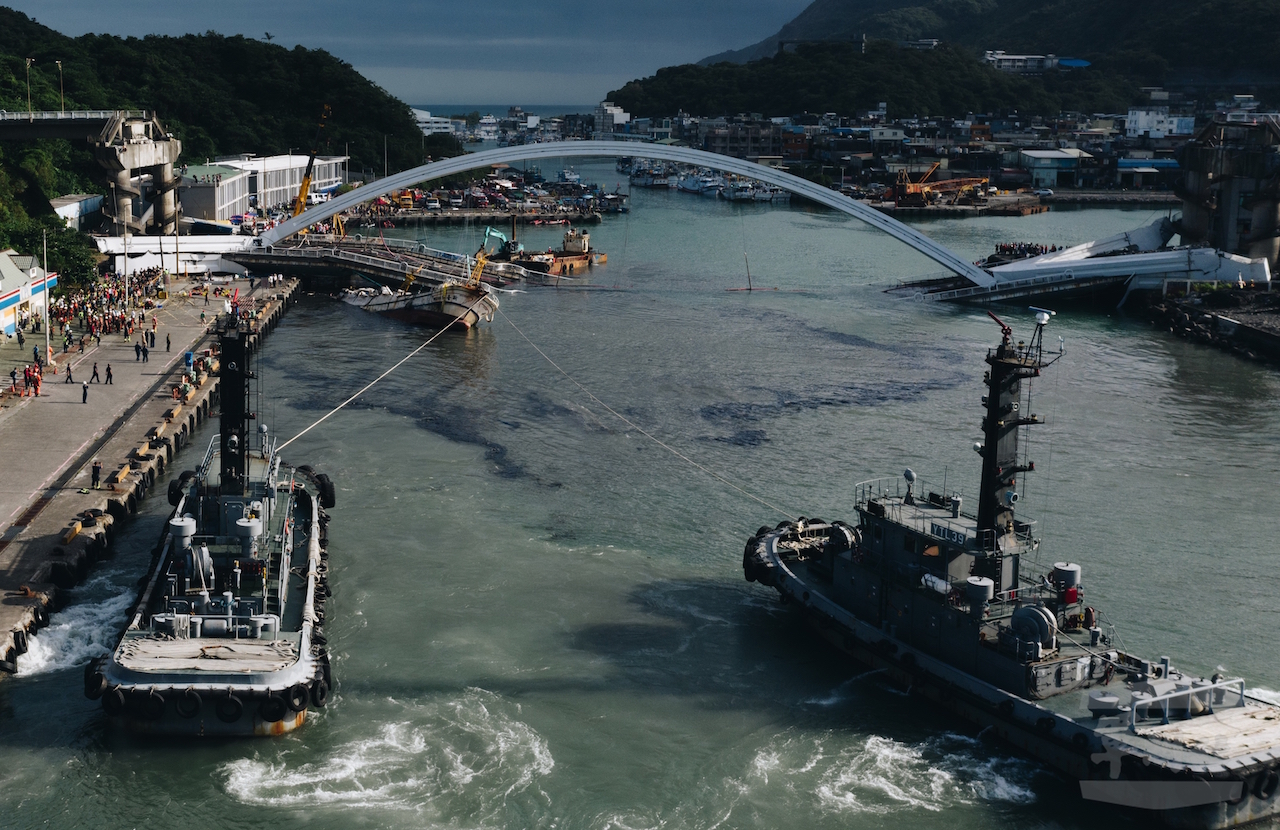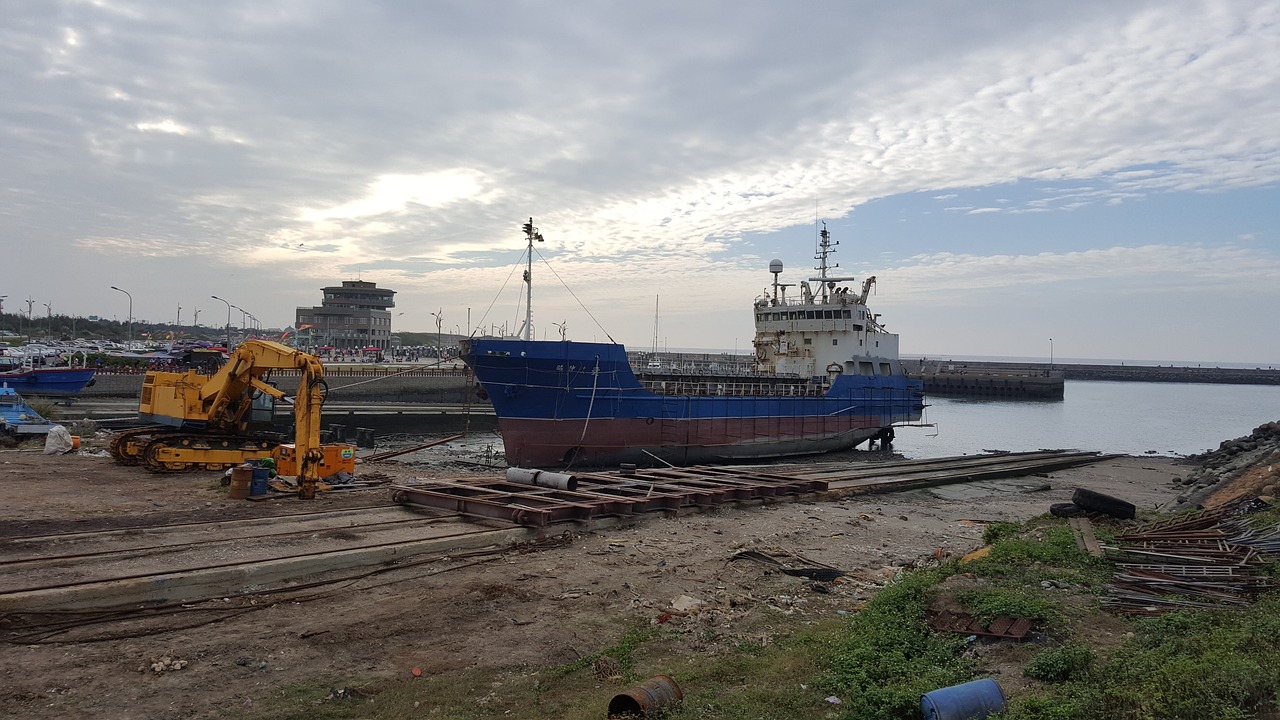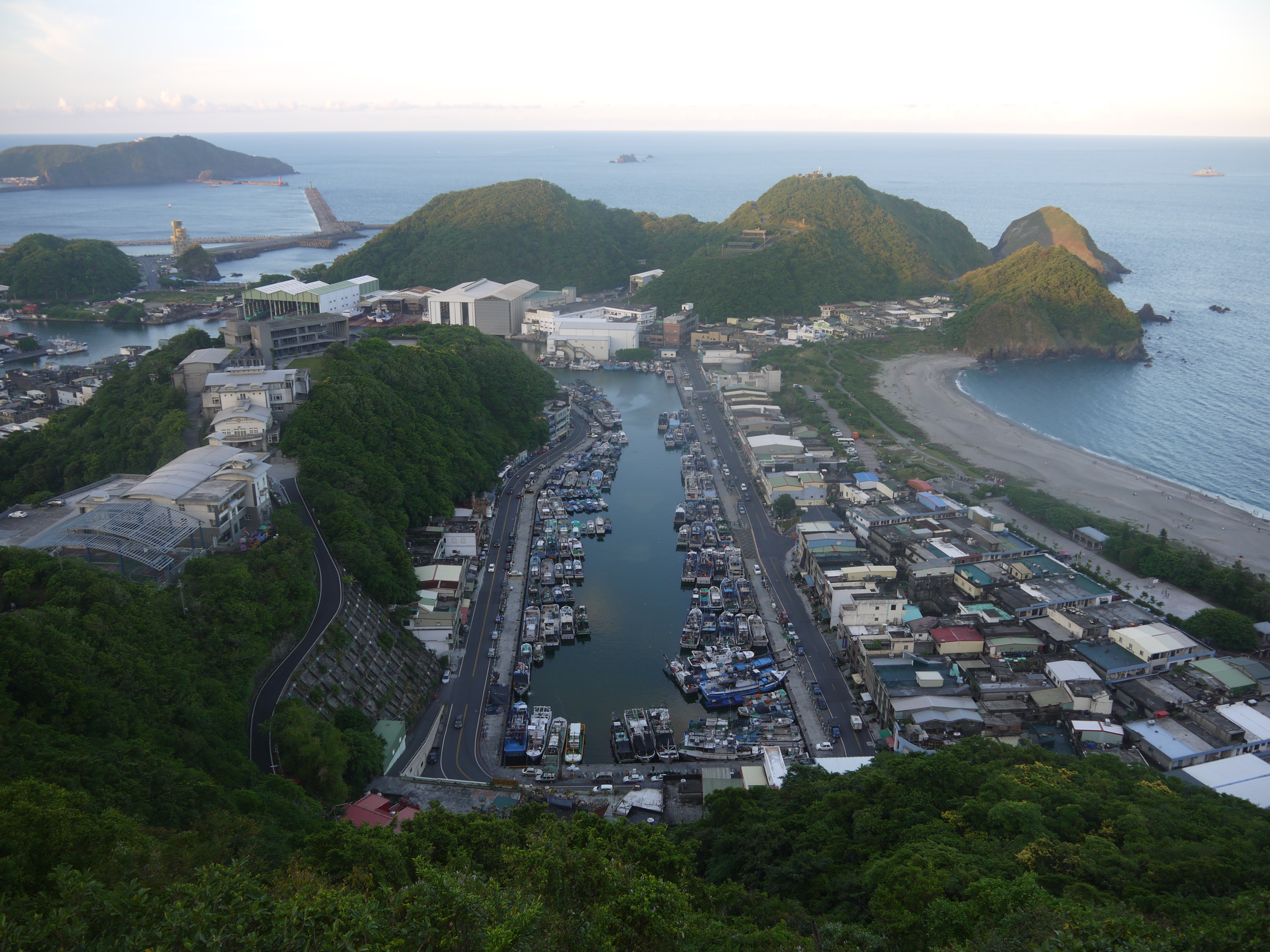by Andi Kao
語言:
English
Photo Credit: 玄史生/WikiCommons/CC
THE RIPPLE EFFECTS from the collapse of the Nanfang’ao Bridge are slowly but surely merging with political currents in Taiwan, redirecting their force, and fashioning social relations anew. The tragedy can be seen, in one sense, in its particularities. What structural problems might have led to the fatal collapse? Why were migrant fishermen still onboard the fishing vessels despite being off the clock? What responsibility do employers, governments, and neighbors have for the injured and deceased and their families as they move forward from the world-shattering incident? In another sense, the tragedy illuminates modern global processes, namely, the secular growth of guest worker programs, heightening conflict over marine ecologies, and the mounting toll in human suffering of racial capitalism. The diverse responses illuminate the evolving dimensions of social struggle in Taiwan.
 The Nanfang’ao Bridge after its collapse. Photo credit: Military News Agency/WikiCommons/CC
The Nanfang’ao Bridge after its collapse. Photo credit: Military News Agency/WikiCommons/CC
Most responses to the tragedy have focused on the deplorable living and working conditions in commercial fishing. Journalists, government officials, religious figures, civil society representatives, and social media-ites have forcefully decried the lack of access to onshore housing, cramped and filthy accommodations on boats, long working hours without overtime pay, dangerous conditions of work, and minimal coverage of labor rights and protections and social welfare benefits for migrant fishermen. This focus dovetails with intense scrutiny of global seafood production in recent years. But whereas previous investigative reports have emphasized the “lawlessness” of social relations aboard Taiwan’s distant-water fishing fleet, media coverage stemming from the Nanfang’ao tragedy has more squarely placed the blame for deplorable working and living conditions on socio-political institutions.
This is a welcome shift for several reasons. First, approaching the injustices of marine resource extraction through a “frontier” framework erases state responsibility for producing the conditions of supposed lawlessness. Although the Taiwanese state is not a party to the 1994 United Nations Convention on the Law of the Sea (UNCLOS), it has adopted its categories to exclude migrant workers employed on distant-water vessels from labor law protections. Whereas the Ministry of Labor (MoL) exercises jurisdiction in “coastal waters,” the Fisheries Agency (FA) governs waters beyond Taiwan’s exclusive economic zone (EEZ). The extraterritoriality of the high seas is less an obstacle to regulating capital-labor relations in the commercial fishing industry than an essential condition for state negligence. According to Yilan Migrant Fishermen Union (YMFU) Secretary-General Allison Lee, the MoL and FA have deliberately sought to evade responsibility for monitoring capital-labor relations in the commercial fishing industry. Indeed, MoL and FA representatives have argued over jurisdictional authority at government meetings, each attempting to assign responsibility to the other.
The Taiwanese state also has a hand in the subjugation of migrant fishermen through the institutionalization of multiple forms of unfreedom—including labor market mobility and debt bondage—enshrined in its guest worker program. Migrant workers are prohibited from applying for residency rights or changing employers except under strict circumstances. Migrant fishermen employed on distant-water vessels, moreover, are severely limited in their freedom of movement onshore. State policies act as disciplining mechanisms by strengthening the power of employers, labor brokers, and boat captains at the expense of migrant fishermen. A “frontier” framework glosses over the ways in which state and non-state institutions are complicit in exploitation and immiseration. As W.E.B. Du Bois famously argued, state-sanctioned violence and expropriation are not incidental to capitalist development, but its very foundation stones.
Second, frontier narratives foregrounding the “lawlessness” of the high seas approach the abusive practices of global seafood production through a dubious, and often patronizing, logic of human rights. This framework constructs migrant fishermen as victims rather than as dignified human beings with legitimate desires and decision-making rights. Pursuing justice through a human rights framework creates the perverse incentive for individuals to renounce self-agency so as to portray themselves as helpless victims. These are not simply semantic matters but involve different legal processes with distinct forms of, and possibilities for, redress involving different levels of governance authority. The boundaries between human trafficking, human rights violations, and labor exploitation, are notoriously difficult to establish in practice. Human rights cases are therefore long, drawn-out processes that typically take little account of the needs of those purportedly being served. More troubling, ‘victims’ of human trafficking are often unceremoniously ‘returned’ to their home countries with little regard for their wishes or well-being. A human rights framework demands that migrant fishermen accept whatever conditions remove them from direct relations of abuse. In this sense, such a framework is closer to Martin Luther King’s conceptualization of a ‘negative peace’ —the absence of conflict, than a ‘positive peace’—the presence of justice.
The discourse of human rights has also proven useful for imperialist interests due to the imperative to act on behalf of, and the unequal power dynamic in the savior-victim relation. The nexus linking “lawlessness,” “human rights,” and militarization is not coincidental, as frontier ideologies are intimately connected with the violence of settler colonialism wherein indigenous peoples and environments are articulated as “uncivilized” objects to be controlled, managed, and cleared away. The connection between human rights and American imperialism is epitomized by C4ADS, a shadowy non-profit organization with deep ties to the US military-industrial complex, including CIA-backed Palantir Technologies, owned by Silicon Valley tech billionaire Peter Thiel . C4DS actively cultivates ties with government actors and civil society organizations, including in Taiwan. The organization lists human rights violations associated with the global fishing industry as a transnational security issue This is not to excuse violence, abuse, or crimes against humanity through a gutless appeal to ‘cultural relativism.’ Rather, it is to point out that the discourse of ‘human rights’ can, and has, acted as a legitimizing cover for imperialist projects that are fundamentally at odds with its declared moral principles. This is the pernicious hypocrisy at the core of Western civilization that James Baldwin describes so eloquently in his writings on the psychology of whiteness.
Perhaps most importantly, dominant human rights frameworks have a remarkably hollow concept of history. By treating injustice and violence as discrete events to be remedied, such ontologies are fundamentally ahistorical ways of seeing social relations. Missing from these narratives is what bell hooks names as “imperialist white supremacist capitalist patriarchy.” Approaching problems in the commercial fishing industry through the dominant human rights framework detaches the labor process from the increasing financialization of marine ecologies and consolidation and vertical integration of capital in marine resource extraction. This framework misses, too, the culpability of Taiwanese capital in displacing people from communities in Southeast Asia so that migration for low-waged ‘3D’ jobs—referred to as such because they are “Dirty,” “Dangerous,” and “Demeaning”—becomes an attractive option. It is, in short, to see what Woody Guthrie might describe as the violence of the ‘six-shooter,’ but to miss the violence of the fountain pen.
 Photo credit: Maxpixel/CC
Photo credit: Maxpixel/CC
Incidentally, this ignorance of history goes a long way in explaining how human rights could be deployed for nefarious purposes in the guise of “Responsibility to Protect” (R2P) or “humanitarian interventions.” In the absence of a philosophy of history, moreover, “human rights defenders” can easily be overwhelmed by despair and hopelessness, as the tremendous violence of the world can appear random, chaotic, and senseless rather than stemming from hegemonic ideologies, relations, and practices.
In moving away from the logic of the “lawlessness” of commercial fishing, the public discussion generated by the tragedy of the Nanfang’ao Bridge collapse has usefully underscored the role of socio-political institutions in producing the conditions of social misery. There is still a conspicuous lack of clarity, however, regarding the nature of these institutions. The tragedy primarily involved migrant fishermen employed in Taiwan’s coastal (境內) waters. Despite highlighting the role of government agencies, employers, and labor brokers, there is a real danger that the focus on socio-political institutions in this instance will perpetuate the false binary between the “lawless” high seas and national sovereignty within EEZs. Even advocates for the rights of migrant fishermen have continued to fall into this trap. Just as the policies of border control are not merely about keeping people “in” and “out,” but simultaneously about controlling racialized populations within a territory, the politics of the high seas do not cleave neatly into an inside/outside distinction. As argued earlier, the “frontier” is not a natural space existing outside the boundaries of the state, but is constructed as such involving “the commodification of nature, the scramble for land and resources, the imaginaries of self and others, the erasure of existing orders, and the establishment of new patterns of governance and regimes of regulation.” The point, ultimately, is that it is misleading at best to discuss the problems of global seafood production without addressing the role of boundary-making processes animating the political economy of marine resource extraction.
A still more troubling dynamic has been the Janus-faced state response to the crumbling of the Nanfang’ao Bridge into the waters of the Pacific. On the one hand, the Su’ao District Fishermen’s Association and the Labor Affairs Department of the Yilan County Government have viciously attacked the Yilan Migrant Fishermen Union (YMFU), seeking to discredit it and pressure elected union officers to resign their positions. The flagrant violation of labor law by the highest echelons of the Labor Affairs Department of the Yilan County Government, an agency ostensibly tasked with protecting the rights of workers, would be truly astonishing if not for the fact that migrant workers are systematically devalued, disciplined, and discriminated against by Taiwanese state, capital, and society. Indeed, the guest worker program is a brutal system designed to extract cheap labor from migrant workers while minimizing social welfare benefits and preventing permanent settlement.
On the other hand, under pressure to respond to criticisms of the living and working conditions confronting migrant fishermen, the state is planning to refurbish mass housing originally used by Chinese migrant fishermen into housing for migrant fishermen in Nanfang’ao. Scholars of migrant labor in China have shown how such ‘dormitory labor regimes’ function as mechanisms of control but, also, unintentionally, potential sites of collective resistance. Nevertheless, rather than strengthening the self-autonomy of migrant fishermen by increasing housing options for migrant fishermen, for example through legislating increased minimum wages or reducing labor broker fees, the state is instead focusing on access to housing through a top-down approach. Never mind the fact that plans to provide onshore mass housing in 2012 were already met with a cool response by migrant fishermen who were unenthusiastic about potential curfews and other forms of monitoring, paying rent for state housing, and being housed far away from the hustle and bustle of the harbor.
The philanthropic attitude of the state toward migrant fishermen is indicative of a dominant human rights approach that has informed public discourse on the problems inhering in the Taiwanese commercial fishing industry. The consequence, ironically, is that migrant fishermen and workers, in general, are not perceived as agential human beings, but as always already victims or potential victims. It is through this patronizing logic that the state’s simultaneous attacks on the Yilan Migrant Fishermen Union and plans for mass onshore housing should be understood.
While mass housing might foster solidarity and resistance out of collective living under the thumb of state and management, we should be clear about the politics of control embodied by the dormitory regime. For American revolutionary Grace Lee Boggs, “The essence of socialist revolution is the expansion of the natural and acquired powers of human beings, not the nationalization of property.” The goal, then, is to work towards expanding the freedom and self-autonomy of oppressed peoples. Or, in other words, what we are working towards should not be power over people, but rather power to the people.
 Photo credit: Chi-Hung Lin/WikiCommons/CC
Photo credit: Chi-Hung Lin/WikiCommons/CC
While the discourse of human rights is appealing because of its ability to attract public sympathy, it is a questionable route for guiding political activity. Not only does the logic of human rights suffer from a savior mentality, gloss over important structural conditions driving exploitation and abuse, and carry dubious ties with imperialism, but it is also a constantly moving target that makes it difficult to pin down concrete collective reforms. At a recent meeting of the Human Rights Promotion Panel of the Executive Yuan, Minister Without Portfolio Luo Bin-Cheng (羅秉成) noted that establishing a set of criteria for human rights violations has been extremely challenging. Who should have the authority to decide whether human rights violations have occurred, and at what stage, is also a source of debate. Some argue for limiting prosecutors’ ability to drop human rights cases which they feel don’t have a strong chance of winning, or that civil society organizations should have equal standing to make judgments on human rights cases.
By way of conclusion, let us return to the conditions criticized by a wide range of actors in the aftermath of the Nanfang’ao Bridge collapse: the lack of access to onshore housing, cramped and filthy accommodations on fishing vessels, long working hours without overtime pay, dangerous conditions of work, and minimal coverage of labor rights and protections and social welfare benefits. A basic and meaningful change would be to grant migrant workers the most basic freedom under capitalist relations: the ability to freely sell their labor. It is the repressive nature of the guest worker program, not the unique characteristics of the commercial fishing industry or, for that matter, the domestic care sector, that most fundamentally deny migrants from Southeast Asia the ability to alter their circumstances of social reproduction. Organizing for freedom, therefore, offers a broad-based vision and platform for a multiplicity of groups working for peace and human dignity.

